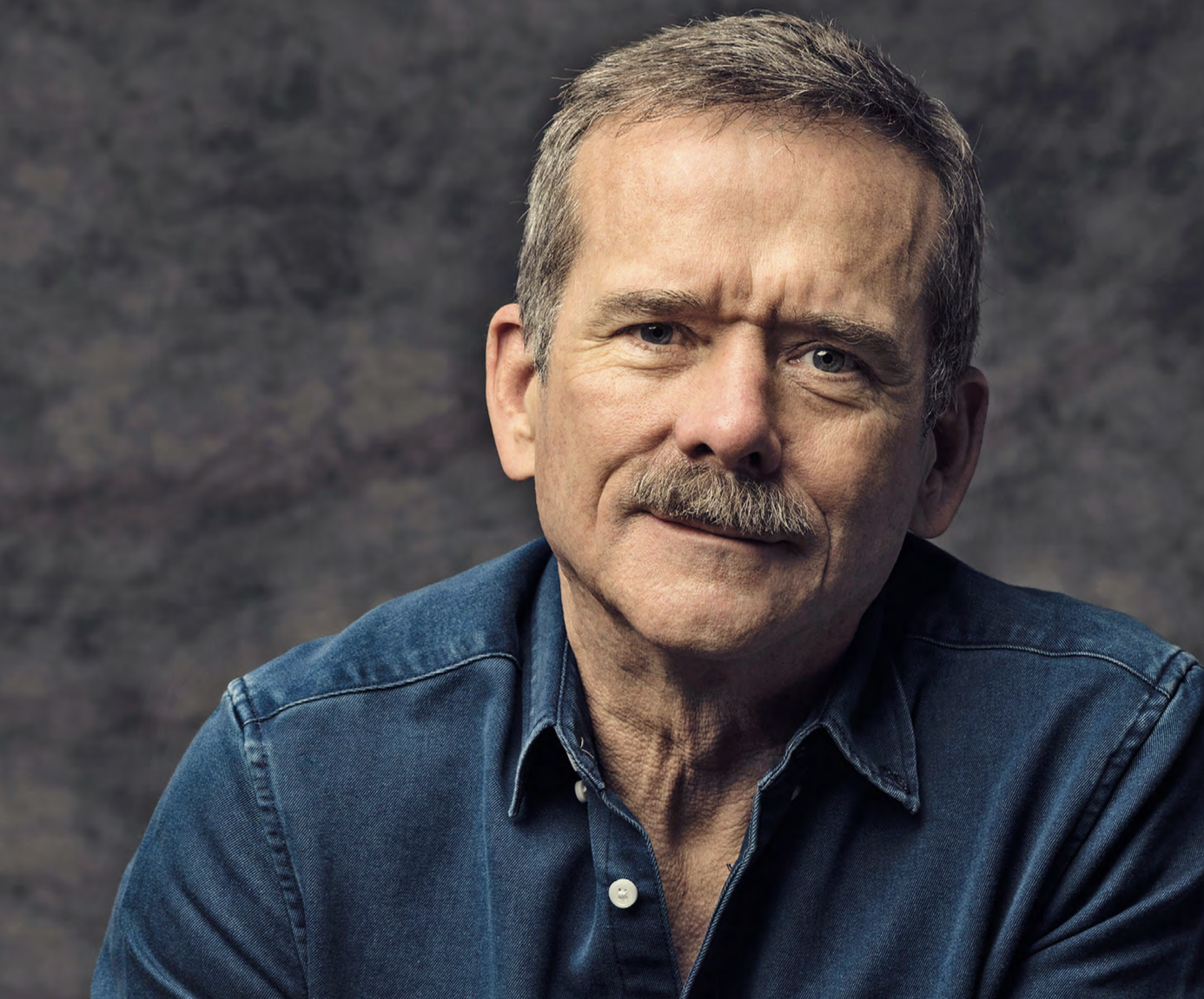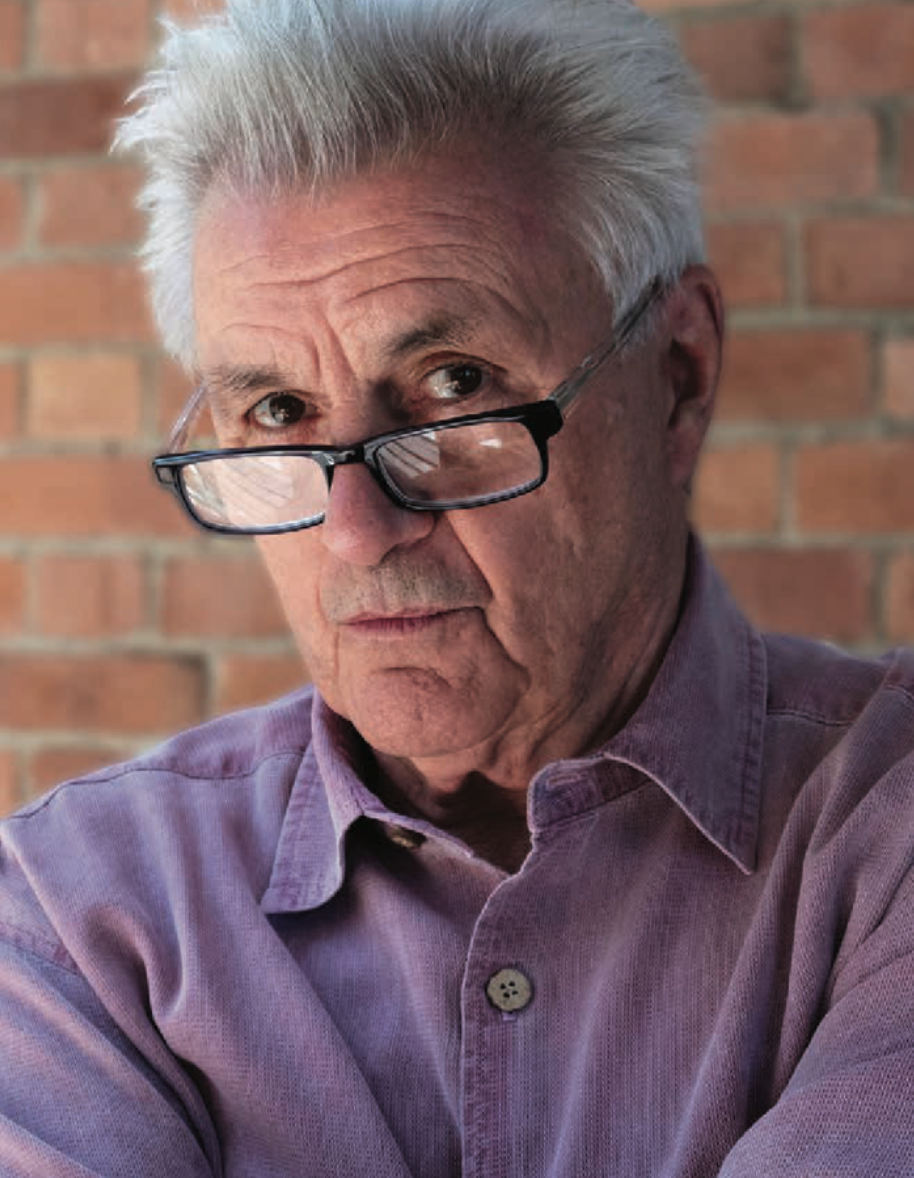By Peter Feniak
Whether he’s commanding a spaceship, test-flying a jet, or crafting a page-turner, for this Canadian hero, the key is deep attention to detail
“For here am I sitting in a tin can / Far above the world.”
The wistful voice from space became an indelible mem- ory—Chris Hadfield, commander of the International Space Station (ISS), was singing “far above the world,” floating in low gravity with his guitar. It was the first music video filmed in outer space, and the world began to buzz about the intrepid Canadian astronaut. That video has now passed 50 million views.
Hadfield’s performance of David Bowie’s “Space Oddity” was a farewell on his last day in space. On May 14, 2013, after five months and 2,336 orbits of the earth, Hadfield and two crewmates detached from the ISS and rode their Soyuz spacecraft to a hard landing on the flatlands of Kazakhstan. It had been Hadfield’s third space mission. Post-recovery, he resigned from the Canadian Space Agency, and after years of service abroad, he, his wife, Helene, and their three children returned to Canada.
Just over 10 years since, Hadfield’s voice is energetic and enthusiastic. He’s speaking from his cottage on Stag Island on the St. Clair River. (East of Sarnia, it borders both Ontario and Michigan.) “This is the place where I made the conscious decision to turn myself into an astronaut; it’s a beautiful day with blue water flowing by. I’m very happy to be here.” Hadfield was not quite 10 when he made that decision. Remarkable determination and achievement would follow.
We’ve connected to talk about his sixth and latest book, a thriller called The Defector (Random House Canada, 2023). Hadfield is a bestselling author now. He’s also a sought-after technology consultant, a board member, a popular speaker, a musician, and more. In space, his days were full. His scientific duties on the ISS were demanding, but Hadfield revealed the breadth of his interests by going further—connecting to earth via social media, he did interviews, shared photographs, and told stories for chil- dren. Back from space, Hadfield wrote an inspirational global bestseller: An Astronaut’s Guide to Life on Earth (Random House Canada, 2013). The Toronto Star called it “riveting.” Others suggested that he had become “arguably the most famous astronaut since Neil Armstrong.”
From Sarnia to Space
Hadfield has always had a passion for learning. “My par- ents [Roger and Eleanor, now in their late 80s] very much valued curiosity but not just asking ‘why?’ You have an obligation to find out the answer,” he says. Curiosity drives his writing. The Defector is set in the Cold War pressure cooker of the early 1970s. As the Yom Kippur War is about to erupt, an elite Soviet pilot dramatically lands his MiG-25 jet in Tel Aviv. “I have secrets of great value,” he declares. “Am defecting to the United States of America.” The action novel moves quickly and globally in locales from Moscow to Houston, from the cosmonaut centre in Star City near Moscow to Caesars Palace in Las Vegas. It ends in a dramatic standoff at night in the off-limits U.S. testing grounds of Nevada.
The Defector also takes readers into the world of high-flying, death-defying test pilots and the remarkable jets they fly. Hadfield knows well the classic rivalry between the elite pilots who patrol our borders and the high-profile astronauts. “I’m so deeply in those worlds,” he says. “I did all of those jobs. I was an F-18 test pilot and an F-18 fighter pilot. I really understand what’s going on there. And, yes, a lot of fighter pilots look down their noses at tech [space] pilots: ‘Oh, you’re just a nerd.’” Hadfield simply admires each identity. “I love flying the most com- plicated airplanes ever built,” he says. “I love their power and complexity and capability—and the freedom that they give us. I’m really interested in how they work and why and how to make them better. And so, to me, the best job was to be a fighter test pilot—which I absolutely loved. [He praises the Tom Cruise blockbuster Top Gun: Maverick—“It’s the best flying movie I’ve ever seen.”] There was only one job left that seemed like a step up and that was what I was lucky enough to do when I was selected by the Canadian Space Agency.”
His dream of space began on July 20, 1969, with the murky television pictures of Neil Armstrong setting foot on the moon. In April 2001, helping to install the valuable robotic Canadarm2, Hadfield himself would walk in space. He still marvels: “To fly in space three times, to do Canada’s first space walks and then be the only Canadian who’s ever commanded a spaceship—it’s surreal.”
Hadfield’s career path reveals an amazing sense of purpose. As a teenage Royal Canadian Air Cadet, he earned a glider licence. He joined the Canadian Armed Forces and earned an engineering degree at Royal Military College of Canada in Kingston, Ont., and then, after gradu- ate work at University of Waterloo, got top marks in flight training and jet training. He moved to tactical fighter oper- ations, ultimately becoming the first CF-18 pilot to inter- cept a wandering Soviet bomber in the Canadian Arctic. He left Canada for further training at the legendary Edwards Air Force Base in California. Graduating in 1989, he became an exchange officer with the aviation branch of the U.S. Navy. He worked with NASA, his experience deepened, and ultimately, in 1992, he applied and was chosen to join the international world of space explora- tion. Out of 5,330 applicants, he was one of the four Canadians selected to become an astronaut.
Flying is second nature in the Hadfield family. The airport in Sarnia, where he was born, is now named for him. Hadfield tells me, “The very first pilot who ever land- ed there and the first pilot who was the chief instructor there back in the 1950s was my dad.” His two siblings, David and Philip, both became airline pilots.
Hadfield still loves flying today: “Actually, I flew this morning—down to Ohio and back. As a pilot on all types of airplanes, I learned to refresh myself in great detail every single time I fly. I do significant work on all of the proced- ures and on the technical stuff so that I understand that. And then I consider all the potential emergencies and fail- ures and things that can go wrong, so when the unexpect- ed comes, I can be calm about what’s happening. But it’s deep, deep preparation—that’s the way I’ve approached aerospace my entire career.”
Preparation also enlivens Hadfield’s writing. Research for The Defector meant plenty of travel and study. “You speak to the experts,” he says. At the U.S. Air Force Museum in Dayton, Ohio, he “crawled all around” the interior of the existing Russian MiG-25, the “highest, fastest jet.” He absorbed the mysteries of the Penetrator spy helicopter that played a key role in 1970’s Cold War intrigue. He travelled to the salt flats in Nevada and imagined its off-limits secrets.
Writing The Defector also meant further education in the history of global turmoil. “I’m quite expert in some specific areas,” he says, “and I’m a complete neophyte and ignoramus in most topics. But one of the great delights of life is to try to learn new things and get a clearer picture of how all this fits together. I dug through world events— what was going on, the major players, the major factors, the major influences.”
A Successful Landing
Research took him “to Israel, right up to the Lebanese border and to the Golan Heights,” he says, adding that he spent time in Tel Aviv, including visiting then-Prime Minister Golda Meir’s home-office command centre. “I took trips from Las Vegas out to Groom Lake [the vast salt-flats site of secret landings], drove right around the nuclear-test establishment there up the road to Area 51 [the still highly classified and mysterious testing zone], and stayed in remote Rachel, Nevada, just to really try to get a feel for it all,” he continues. “You open this door and you sense ‘This could have happened.’ Not only would the Soviets have some satellite imagery of it but there’d be the temptation to start picking up the pieces and do reverse engineering. The temptation would have been enormous.”
The Defector portrays both sides of the Cold War. There’s a cautious friendship between the two main characters, U.S. jet pilot “Kaz” Zemeckis and Soviet ace Alexander Abramovich (nicknamed “Grief ”). “People aren’t uniform- ly bad or uniformly good,” Hadfield insists. “They’re just people.” Of the Soviets, he adds: “I lived in Russia for five years. I was NASA’s Director of Operations in Russia; I speak the language. It’s easy to look at someone else’s culture and just be dismissive of it. But people behave the way they do because they’re following their own reason- ing, their own rules, their own culture, their frustrations… their joys. I’m by no means the world’s best writer, but I try to stay true to everybody’s character as much as I can—and to historical fact. And then I build in as exciting a plot as I can imagine amid all of that.”
As we talk, Hadfield is happy to relate that his first thriller, The Apollo Murders, also featuring Zemeckis, “has just been signed for adaptation to an eight-part television series.” As The Defector launches in October, he has already begun work on what will become the third book in a ser- ies, and several current projects are buzzing. The Hadfield family’s return to Canada can be confirmed as a success- ful landing. “The intent was always to come back and live here,” he says. “We are so fortunate to have been born in Canada. It’s just a wonderful place.”
Curiosity still drives this extraordinary Canadian. Who inspired his productive enthusiasm? “Gosh,” he laughs, “everybody’s a mentor, even the people who are bad examples—with bad examples you can go ‘Ho! I won’t do that.’ But, my parents, of course, and then my wife, Helene. We met in a high school play and we’ve been together 47 years. We’ve learned a huge amount from each other. Every single person I’ve met along the way, I would say, has been a mentor, an instructor. And one of the precepts that I’ve always held to is when somebody with expertise is willing to tell you something, listen…pay attention… learn from that person. Even
if it’s their only skill, it doesn’t matter. Learn what you can from the experts around you and it’s amazing what can happen in life.”






